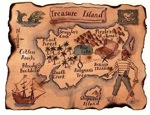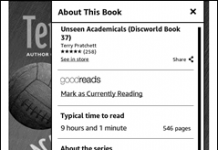
According to The Bookseller:
Intellectual property agency 1454 has developed a new interactive children’s adventure series that will be published exclusively on the Kindle worldwide. It is thought to be the first time a children’s series has been produced solely for digital release.
BookSurfers, written by the children’s writer David Gatward, is aimed at nine to 12-year-olds and is based on the classic novels Treasure Island and The Wonderful Wizard of Oz. The four Booksurfers, Ryan, Jake, Becca and Harriet use a bespoke digital gadget called The Nautilus to jump into classic adventure stories with the reader able to use hyperlinks to connect to the corresponding points in the original classic.
The classic novels are bundled in with the price of the new book, meaning readers can explore both books as the narrative unfolds. Two further titles based on Robin Hood and A Christmas Carol are also slated for release later this year.

































In one sense, it’s nice to know that my Kindle will do more ‘stuff,’ although the value in making a marvelous kids adventure like Treasure Island, “interactive’ is dubious. It’s a bit like putting a picture frame around a pretty girl. Exactly what are the benefits of these added hyperlinks? When kids read a story, they want to read the story itself not see it gussied up by dorks of far lesser talent than Robert Louis Stevenson. Kids have enjoyed Treasure Island for over 130 years without this fluff. Do they really need it?
But what bothers me most is the fact that this series will be “published exclusively on the Kindle worldwide.” Everyone in the new publishing industry, particularly Amazon, seems to be into exclusivity. Digital books were supposed to open up the world of books. In the greedy little hands of Apple and Amazon, ebooks are narrowing the world of books. Examine either Apple or Amazon’s publishing contracts, and you’ll see that readers, least of of children readers, are of far less important to those behemoths than what their lawyers and corporate bean-counters are thinking. Both care far less about content than control.
Even the one exception, Google, proves the rule. It the original version of the now defunct Google Book Settlement, it wanted to use legal shenanigans to abrogate the U.S. copyright for every out-of-print but in-copyright book on the planet, whatever the original language. That set-aside would only benefit Google. No other publisher would gain that “exclusivity.”
As technology advances, there’s far less to gush about than many think and much to criticize.
There’s another problem here, besides exclusivity. The two books are “based on” the originals. The point of “based on” is almost always to simplify, sometimes even to bowdlerize. Given the differences in language alone, children will probably stick with the simpler version and if they do try a few links to the original, that will more likely confirm them in sticking to the modern version rather than interest them in the original. This is simply a different version of Disneyization. I wonder how many kids have read Beauty and the Beast or any of the other stories that the Disney cartoons are based on. I’d be willing to bet that most of them know the stories *only* from the movies.
That’s funny, we’ve already done three illustrated children’s books for digital readers and we were far from the first. All ours do is entertain and teach, not flash and hype.
Scott